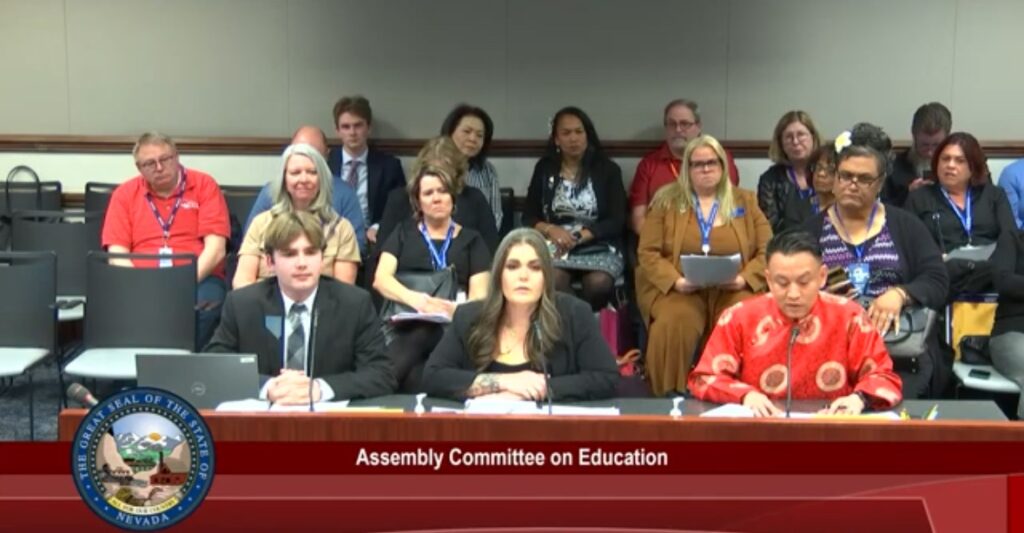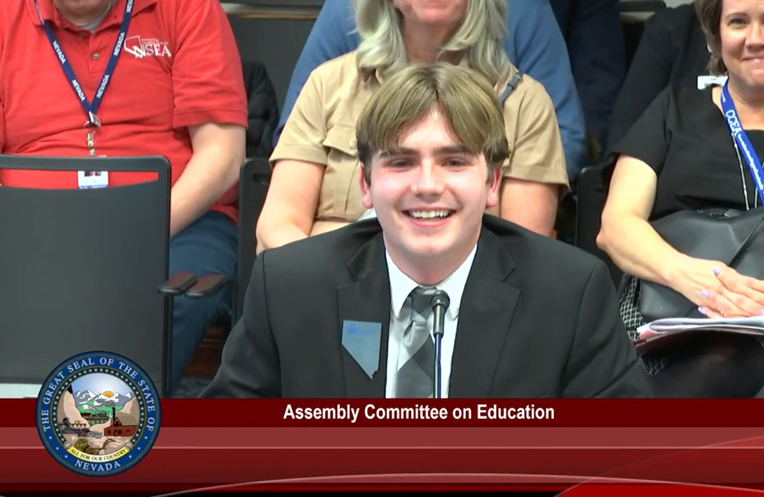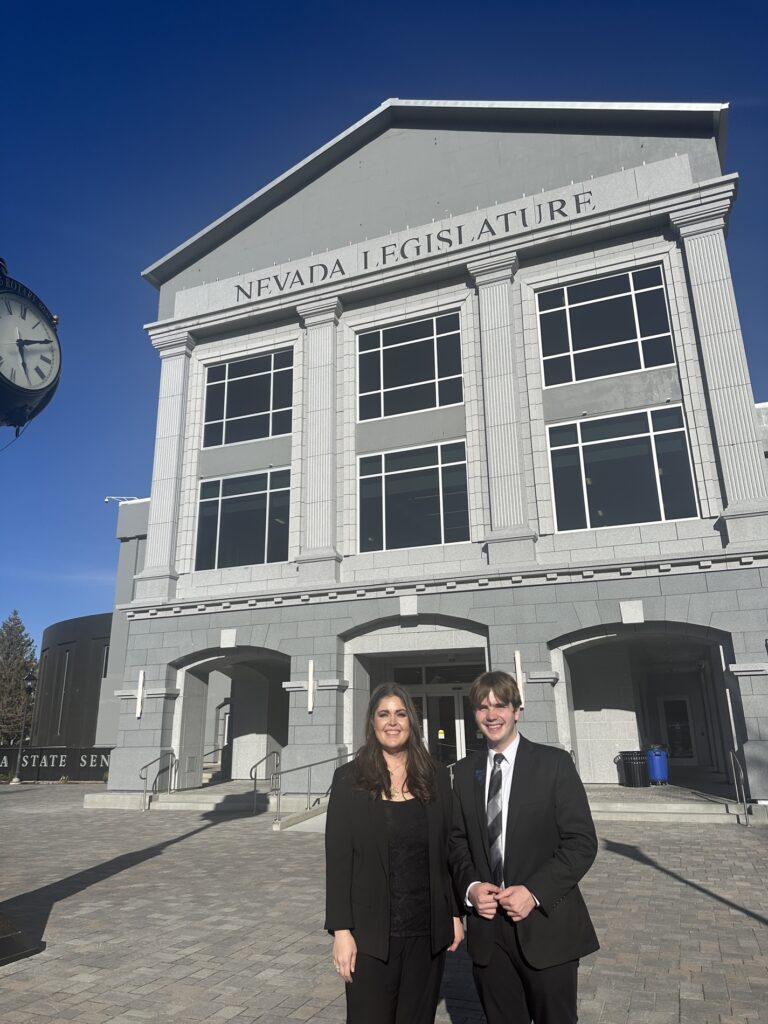Michael Keyes is not your average high school student. As the current student representative on the Nevada State Board of Education, he has taken on a formidable challenge—one that reaches beyond the classroom and into the halls of state government. With a clear vision, relentless determination, and an unshakable belief in student representation, Keyes has been at the forefront of a legislative effort to give students a voice where decisions about their education are made.
The proposed legislation, Assembly Bill 316 (AB316), was designed to establish a non-voting student advisory position on local school boards across Nevada. Essentially, it would replicate the role that Keyes currently holds at the state level and bring it into districts where decisions more directly impact students’ daily lives. “AB316 would have put an advisory student position, a non-voting position, on local boards of education across the state,” Keyes explained. “This would give students a seat at the table—a chance to be heard.”

Keyes’ advocacy for the bill has been nothing short of impressive. Traveling to Carson City to testify in front of the Assembly Education Committee, he helped to present the bill and responded thoughtfully to concerns raised by lawmakers. Among the objections were issues surrounding student compensation and access to confidential information. These, Keyes said, were legitimate and taken seriously. They were addressed in a revised amendment to the bill. “We made sure those concerns were handled,” he said. “We added language to clarify that students wouldn’t be part of closed-door sessions or have access to sensitive information.”
Despite gaining broad bipartisan support within the committee, the bill was ultimately shelved—not because it lacked merit or support, but because of procedural authority. Assemblymember Selena Torres-Fossett, the chair of the committee, declined to place the bill on the agenda for a vote before the required deadline, effectively killing it. “We had nearly unanimous support from the committee,” Keyes said. “But since she’s the chair, she controls the agenda, and without her allowing it to be voted on, it didn’t move forward.”
That decision left many, including members of the committee, disappointed. Some of them, according to Keyes, expressed regret that the bill was not heard. Though Keyes hasn’t been able to speak with them directly due to the ongoing legislative schedule, the consensus seems clear: the bill had the backing of lawmakers, but not the greenlight from leadership.
Still, Keyes isn’t deterred. He has identified three paths forward. The first, albeit the least likely, would require Nevada Assembly Speaker Steve Yeager and the Majority Leader to waive the legislative deadlines and allow the bill to move forward—a move that has precedent. “REBA’s Law was revived in the same way because of public outcry,” he noted, referencing a recent high-profile bill that was resuscitated following intense support.
The second option would be to attach AB316 as an amendment to another bill moving through the Senate, provided that bill addresses the same area of state law. The Senate Education Committee, Keyes shared, includes a joint sponsor of AB316, which could increase the chances of such an amendment being considered. “Senator Taylor and Assemblymember Nguyen were both sponsors,” he said. “That could help us get this passed through a different channel.”
The third option is to reintroduce the bill in 2026—something Keyes is already considering, though it would mean another long wait. “I’ll be moving to Reno for college, so I’ll be closer to Carson City and I still want to be involved. If it comes back in 2026, I’ll be ready to help however I can.”
Much of the frustration surrounding the bill’s failure to move forward lies in the lack of transparency. Despite Keyes’ repeated outreach, Assemblymember Torres-Fossett declined to provide detailed feedback on what she found problematic in the bill. “She told me there were problems, but when I asked what they were so I could fix them, she wouldn’t say,” he said. “Eventually, she told me my email was rude. That was her takeaway. I wasn’t being rude—I was advocating for half a million students.”
As Keyes points out, the updated version of the bill already addressed major concerns raised by stakeholders. Confidentiality? Handled. Compensation? Unnecessary for a non-voting advisory role. Meeting times and student workload? Reasonable and manageable. “Some of the arguments just didn’t hold water,” he said. “They worried students wouldn’t have the time. But students make time for what matters to them. We work jobs, play sports, volunteer, and we still find ways to show up.”
In response to the bill’s stagnation, Keyes and fellow students launched a petition aimed at both resurrecting the legislation and holding officials accountable. “It has two goals,” he explained. “To move the legislation forward however we can, and to hold Chair Torres-Fossett accountable for what happened.” The petition has gained traction quickly—over 700 signatures in just the first two days, and has now reached Keyes’ first milestone goal of 1,000. The next milestone Keyes hopes to reach is 1500 signatures.
The support from students has been overwhelming. Dozens called in before the bill’s deadline, voicing their support. But those calls, like Keyes’ own efforts, were dismissed with vague reassurances that “there were problems”—none of which were ever clearly articulated.
Washoe County School District is one example of how the student advisory position can work. They’ve had a version of this role since the 1980s, albeit unofficially. Other districts, such as White Pine County, have similar positions. AB316 sought to formalize and require this structure statewide. “We need this in NRS,” Keyes stressed. “A patchwork of optional roles isn’t enough. Every district should give students the opportunity to participate.”
Locally, Keyes shared that his own school district has approached the idea with caution, but he remains optimistic. He’s already had productive conversations with the superintendent, and many of the concerns raised early on were thoughtfully addressed in the amended version of the bill. “They haven’t shared specific reasons for not wanting to add a position to our board without the requirement,” he noted, “so I’m hopeful we can continue the dialogue and work together toward a solution that benefits students.”
Critics of the bill have pointed to late meetings and potential strain on student time. But Keyes believes those arguments ignore the bigger picture. “It’s about priorities. If a student wants to be involved, they will make the time,” he said. “And quite frankly, adult inconveniences should not come before student outcomes.”
The heart of Keyes’ advocacy lies in a simple but powerful belief: that those most affected by educational policies should have a say in them. “Students are the primary stakeholders,” he said. “We are in these classrooms every day. How can someone who hasn’t been in a classroom in decades fully understand what we’re going through?”
Keyes’ own record of speaking up at school board meetings backs up his convictions. He previously addressed the board regarding a controversial cell phone policy, voicing student concerns that he believed had been disregarded. Though the policy ultimately passed, it was a close vote—and one that showed how much student voices could influence the conversation.
Reflecting on this experience, Keyes admitted that launching the petition and speaking out publicly wasn’t easy. “I have career ambitions in Carson City,” he said. “This could have been really bad for me politically. But I don’t want to be a sellout. If I didn’t do this, I wouldn’t want a career up there.”
Despite the obstacles, Keyes remains optimistic. He believes that the groundswell of student support is not only proof of interest but a promise of change. “Students aren’t pushovers,” he said. “We’re informed. We’re passionate. And we’re ready to hold our leaders accountable.”
As Nevada’s legislative session continues, the fight for student representation isn’t over. Whether AB316 is revived through legislative maneuvering or reintroduced in 2026, Michael Keyes’ efforts have sparked a crucial conversation about student inclusion and the future of education policy in the state. “Students are the next generation of voters,” Keyes emphasized. “If you dismiss them now, you’re going to have some problems when you go to get re-elected.” For now, one thing is clear—Nevada’s students have found their voice, and Michael Keyes is helping them use it.
Follow the links to read the bill and support the petition. See below for the conceptual amendment.





